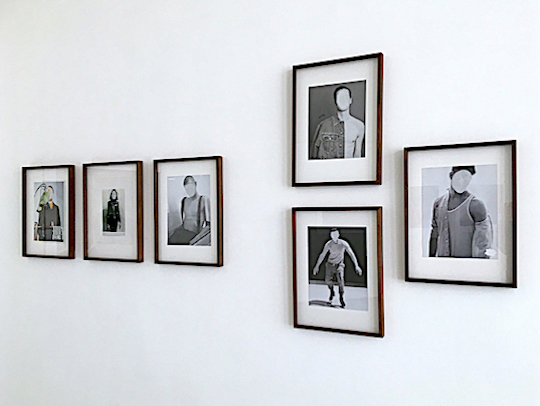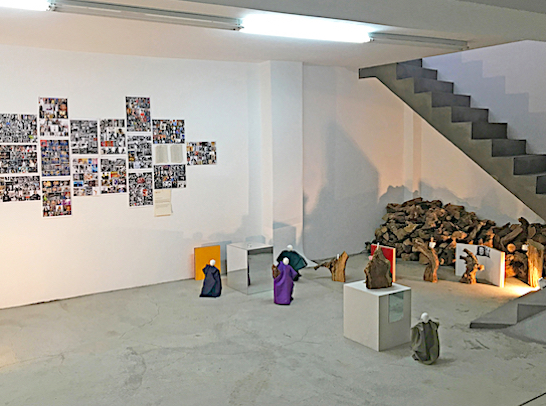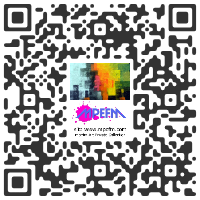"Sunset in Athens (part three)"


T- F +30 210 5228968 e-mail:This email address is being protected from spambots. You need JavaScript enabled to view it.


Betty Fotiou, Melanie Hill, Caroline May, Group Mel-air, Polys Peslikas, Yiannis Theodoropoulos, Lina Theodorou, Dimitra Vamiali

VAMIALI'S
Samou 1 Athens 104 38 GreeceT- F +30 210 5228968 e-mail:
31.03 > 01.07, 2017

|

|
Sunset in Athens (part three) continues at Vamiali's gallery and from Friday 31 March is enriched with new works and new participations. As a project in progress, this exhibition is being developed gradually and in stages within the last months. More works from different artists added to the initial core, so that the context and content grow organically, be fluid and in constant flux, where each artistic practice might enter or intervene in another. An exhibition in progress, at the time of instability, displacement and transformation, inviting the viewer every time to a new experience and a fresh "re-reading".
In the past, the exhibitions titled "Sunset in Athens" were an homage to painting, the new trends and directions. Keeping the same title now for the third part, this version is seeking a different approach. There is a nostalgia in the enigmatic title, a romanticism, but also a covered metaphor, an allegory. In Greek language the word dusk is the same with the word "West". So if we play on words we could say that is this a sunset in Athens or is Athens a city of the West (Europe); A dusk in Athens or Athens, a city that goes down? A symbolic image or the exculpation of the romantic image of the city as a place of enjoyment? The interpretations remain open.
The exhibition "Sunset in Athens" focuses and explores the universal themes of the human condition as love, loss, loneliness, optimism, discontent, imposition, desire, intimacy, longing and embraces the idea of microcosm, which contains an entire universe. Through micro, the artists approach the macro, the human soul and the inexhaustible of the human condition, in order to highlight the subtle practices which through personal, idiosyncratic systems revive a given structure.
"Every day in Athens and all over the world, we see the sunset. East, west, east, west, the sun's path, in an endless cycle, a continuous loop. A given, universal truth. Although, during the last years, the sunset in Athens is a little different. Not as a form, not its colors, but signifies different meanings. It could be our "escape", a reference point or a starting point or that image we wish to evade or deny. Afternoons in Athens are more sad. Unless you draw a strategy, identify an alternative, have a backup plan or create a situation that could do the trick to work, a good reason to remain up standing, to continue to believe or just to continue. It is true that we are trapped in a mental and ideological noway out, in a context that has been imposed. We live in a disordered reality. But if we will talk about our own internal universal truth, our basis and arguments, our deeper roots, this back up plan, one from which we can draw strength, we might be able to define a new value framework and see the sun's path for just what it is, a sunset in Athens. Perhaps the dusk will remain dusk without further hints. But can contemporary art elaborate these issues? Can contemporary art mirror these truths?
In the past, the exhibitions titled "Sunset in Athens" were an homage to painting, the new trends and directions. Keeping the same title now for the third part, this version is seeking a different approach. There is a nostalgia in the enigmatic title, a romanticism, but also a covered metaphor, an allegory. In Greek language the word dusk is the same with the word "West". So if we play on words we could say that is this a sunset in Athens or is Athens a city of the West (Europe); A dusk in Athens or Athens, a city that goes down? A symbolic image or the exculpation of the romantic image of the city as a place of enjoyment? The interpretations remain open.
The exhibition "Sunset in Athens" focuses and explores the universal themes of the human condition as love, loss, loneliness, optimism, discontent, imposition, desire, intimacy, longing and embraces the idea of microcosm, which contains an entire universe. Through micro, the artists approach the macro, the human soul and the inexhaustible of the human condition, in order to highlight the subtle practices which through personal, idiosyncratic systems revive a given structure.
"Every day in Athens and all over the world, we see the sunset. East, west, east, west, the sun's path, in an endless cycle, a continuous loop. A given, universal truth. Although, during the last years, the sunset in Athens is a little different. Not as a form, not its colors, but signifies different meanings. It could be our "escape", a reference point or a starting point or that image we wish to evade or deny. Afternoons in Athens are more sad. Unless you draw a strategy, identify an alternative, have a backup plan or create a situation that could do the trick to work, a good reason to remain up standing, to continue to believe or just to continue. It is true that we are trapped in a mental and ideological noway out, in a context that has been imposed. We live in a disordered reality. But if we will talk about our own internal universal truth, our basis and arguments, our deeper roots, this back up plan, one from which we can draw strength, we might be able to define a new value framework and see the sun's path for just what it is, a sunset in Athens. Perhaps the dusk will remain dusk without further hints. But can contemporary art elaborate these issues? Can contemporary art mirror these truths?

|

|


 Caroline May |
 Yiannisv Theodoropoulos |
 Lina Theodorou |







